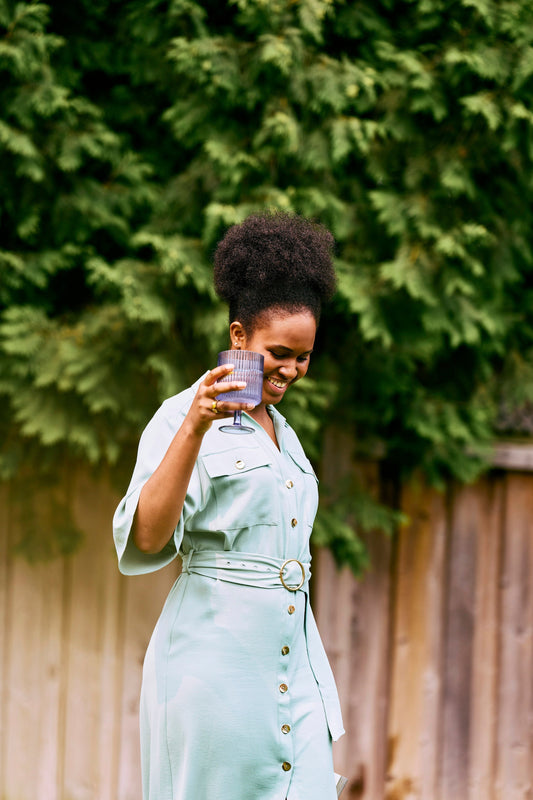The end of daylight savings, the winter blues, and winter-pattern seasonal affective disorder can all wreak havoc on our daily energy and mood. Read on for 6 evidence-backed tips to help!
If your energy drops and mood plummets as the days become shorter and darker, you're not alone. According to the American Psychological Association's Healthy Minds survey of 2,201 adults just last month — 41% of people say their mood worsens over the winter months. 1
But saying "mood goes down" doesn't really do it justice…
You may have found yourself wanting to stay in bed longer, craving more sleep, feeling constantly tired, experiencing mood swings, or feeling less interested in your usual passions.
The point → The changing seasons can greatly impact our ability to get through our days and generally enjoy our lives!
In this article, we'll cover:
➤ 3 Reasons you might be feeling blue every winter
➤ The end of daylight savings
➤ Winter blues
➤ Seasonal affective disorder
➤ 6 Tips to Survive the Winter!
3 Reasons You Might Be Feeling Blue Every Winter…
#1 The End of Daylight Savings
Did you know that the majority of North America observes daylight savings time, save for 2 states in the U.S. and a few locations in Canada? So every year on November 3rd, millions of people gain an hour as the clock falls back. While this adds an extra hour of sleep, it can also affect sleep schedules. With the sun going down between 4:30 and 5 pm on the shortest days of the year, it's natural to start getting tired earlier.
This is because natural light plays a critical role in maintaining our circadian rhythms, stimulating vitamin D, and your "wake systems and hormones" throughout the day. When darkness falls, it triggers melatonin production, AKA our sleep hormone.
So when the days get darker earlier, it shortchanges your daily light and can speed up the onset of sleepiness.
#2 The Winter Blues

The winter blues is a casual term — not a clinical mood disorder. It refers generally to feelings of low energy and feeling a bit more, well, blue. The winter blues often come in waves, hitting us for a few days, then fading for a bit.
If you have the winter blues, you may find yourself:
➤ Wanting to stay in bed longer
➤ Feeling more sad or melancholy
➤ Having less energy throughout the day
➤ Feeling less motivated and like you have to drag yourself through your to-dos
One thing to keep in mind about the winter blues — they may have you feeling down, but they won't impair your ability to function. This is the key differentiator between the winter blues and seasonal affective disorder, which we'll discuss next.
#3 Seasonal Affective Disorder
If you find yourself severely struggling to get through your day every winter, you might be experiencing seasonal affective disorder (SAD). Also called "winter depression," seasonal affective disorder affects roughly 5% of adults across the United States and 1-10% of people worldwide. 2
The DSM classifies SAD as a type of depression that follows seasonal patterns. There are two types of SAD — summer-pattern and winter-pattern. Symptoms of winter pattern SAD lasts about 4-5 months, through the fall and winter. Seasonal affective disorder symptoms include many of the hallmark symptoms of depression, with some additional symptoms. 3
Core symptoms of depression
➤ Trouble sleeping
➤ Consistently low energy
➤ Feeling fatigued and slow
➤ Difficulty maintaining focus
➤ Changes in appetite and weight
➤ Feeling depressed more often than not
➤ Changes in mood, feeling more irritable
➤ Feelings of hopelessness or low self-worth
➤ Loss of pleasure in activities you used to love
➤ Experiencing thoughts about self-harm, suicide, or death
Unique symptoms of winter-pattern SAD
➤ Overeating (featuring a strong craving for carbs)
➤ Isolation (withdrawing socially; “hibernating”)
➤ Oversleeping (hypersomnia)
➤ Weight gain
6 Tips to Survive the Winter!
#1 Try to keep your sleep schedule
When daylight savings ends, many of us find ourselves ready for bed by 7 pm — especially if we're also experiencing the winter blues or SAD. While it's tempting to give in to that early wave of fatigue, an irregular sleep schedule can worsen winter tiredness.
If you're struggling with early evening sleepiness, try these research-backed adjustments:
→ Avoid naps (or stick to 20-minute power naps before 3 pm)
→ Gradually push back bedtime by 15 minutes each night
→ Try to get some morning sunlight or natural light within an hour of waking
→ Keep your wake-up time consistent, even on weekends
#2 Try a natural light box
Research suggests light therapy can be a great tool to help counteract the effects of the winter blues or SAD. For instance, the Yale School of Medicine shares that "exposure to bright light at 10,000 lux for 7 days per week for 30 minutes before 8 am results in substantial improvement in SAD and sub-syndromal SAD for most patients." 4
But here's the challenge: many devices marketed as "light therapy boxes" don't provide enough intensity to be effective.
So when shopping for a light therapy box, look for these 3 essentials:
→ Delivers at least 7,500 lux at 11 inches away
→ Maintains 5,000 lux even if you move slightly
→ Provides even, glare-free light without intense "hot spots"
Pro tip: Download a lux meter app on your phone to verify you're getting the right intensity. Remember: 30 minutes at 10,000 lux = 60 minutes at 5,000 lux = 120 minutes at 2,500 lux.

#3 Squeeze in gentle physical activity
When winter blues hit, exercise might be the last thing on your mind. However, a study of over 14,000 participants published in 2024 in the British Medical Journal revealed that exercise can significantly reduce depressive symptoms — with walking, yoga, and strength training showing the strongest positive effects. 5
The good news: You don't need to tackle an intense workout to benefit. Any movement is better than none.
So start with whatever feels manageable:
→ A 10-minute walk around the block
→ Gentle morning stretches
→ Following a beginner yoga video
→ Dancing to your favorite song
Remember: The goal isn't perfection — it's simply getting your body moving in ways that feel good for you.
#4 Connect with Those You Love
When winter blues hit, it's tempting to withdraw and isolate. But according to a 12-year study of over 4,000 adults recently published in the Lancet, loneliness was linked with nearly one in five (18%) of depression cases the following year — and its effects could persist for over a decade. 6
Researchers also found that each one-point rise in loneliness was associated with a 16% rise in average scoring of depression symptom severity. 6
So, even if you're not feeling particularly social, try to maintain the connections that feel most restorative to you:
→ Schedule a weekly lunch or coffee date with a friend
→ Sign up for a regular group activity or class
→ Plan video calls with distant loved ones
→ Share a meal with family or neighbors
Remember: Connection doesn't have to be grand or lengthy. Even small moments of togetherness can make a big difference in how you feel.
#5 Feed Your Mood with the Right Foods
Holidays often become a mecca for sugary sweets, unhealthy treats, and a little tipsy fun. We're not saying to avoid them - for many of us, they're part of holiday traditions! But considering the role research suggests diet plays in mental health, striking a balance between your favorite holiday treats and core healthy meals is critical. 7
Try incorporating these mood-supporting foods into your daily meals:
→ Berries
→ Leafy greens
→ Dark chocolate
→ Fish rich in vitamin D
→ Nuts packed with healthy fats
#6 Consider Professional Support
If you're finding it hard to get through your days this winter, please consider seeking professional support. While it might feel uncomfortable, reaching out for help isn't just okay -- it's a powerful act of self-care. A mental health professional can guide you through your experiences and help create a personalized toolkit of strategies.
Remember: You don't have to wait until things feel unbearable to reach out. Early support can make a significant difference in how you navigate the winter months ahead.
Use Evie to Help Guide You Through the Winter Months
Your Evie ring is the perfect companion for navigating winter wellness. By tracking essential health metrics like sleep patterns, HRV, and daily recovery, you can better understand how seasonal changes affect your body and mind.
Notice your energy dropping as daylight decreases? Seeing changes in your sleep quality? Your Evie insights can help you explore your daily experiences on the level of your biometrics and then make informed adjustments. Plus, regular mood tracking in the Evie app helps you spot patterns and take proactive steps to support your wellbeing.
You can think of Evie as your personal winter wellness coach, helping you find balance during the darker months.
Get started with the Evie Experience >
References
1. Two in Five Americans Say Their Mood Worsens in Winter; 29% Say “Falling Back” Hurts Their Mental He. (2024). Psychiatry.org. https://www.psychiatry.org/News-room/News-Releases/APA-Poll-Mood-Changes-in-Winter
2. Cotterell, D. (2010). Pathogenesis and management of seasonal affective disorder. Progress in Neurology and Psychiatry, 14(5), 18–25. https://doi.org/10.1002/pnp.173
3. National Institute of Mental Health. (2023). Seasonal Affective Disorder. Www.nimh.nih.gov; National Institute of Mental Health. https://www.nimh.nih.gov/health/publications/seasonal-affective-disorder
4. How Should I Obtain a Light Box? (2024). Psychiatry. https://medicine.yale.edu/psychiatry/research/programs/clinical-people/winter/obtain/
5. Noetel, M., Sanders, T., Gallardo-Gómez, D., Taylor, P., Cruz, B. del P., Hoek, D. van den, Smith, J. J., Mahoney, J., Spathis, J., Moresi, M., Pagano, R., Pagano, L., Vasconcellos, R., Arnott, H., Varley, B., Parker, P., Biddle, S., & Lonsdale, C. (2024). Effect of exercise for depression: systematic review and network meta-analysis of randomised controlled trials. BMJ, 384(8417), e075847. https://doi.org/10.1136/bmj-2023-075847
6. Lee, S. L., Pearce, E., Ajnakina, O., Johnson, S., Lewis, G., Mann, F., Pitman, A., Solmi, F., Sommerlad, A., Steptoe, A., Tymoszuk, U., & Lewis, G. (2021). The Association between Loneliness and Depressive Symptoms among Adults Aged 50 Years and older: a 12-year population-based Cohort Study. The Lancet Psychiatry, 8(1), 48–57. https://doi.org/10.1016/s2215-0366(20)30383-7
7. Yang, Y., Zhang, S., Zhang, X., Xu, Y., Cheng, J., & Yang, X. (2020). The Role of Diet, Eating Behavior, and Nutrition Intervention in Seasonal Affective Disorder: A Systematic Review. Frontiers in Psychology, 11. https://doi.org/10.3389/fpsyg.2020.01451



